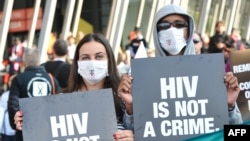Stigma has stuck to AIDS from the very start. When the virus first began to emerge in the 1980s, it cut a wide swath through two groups that have historically faced their own stigma: gay men and intravenous drug users.
More than 30 years later, however, the face of AIDS has changed. Today’s new HIV patient is statistically likely to be a heterosexual African woman.
But as VOA’s new documentary, Living in the Shadows shows, as the reach of AIDS has expanded, stigma remains from Cambodia to Nigeria to Uganda. It even persists, in 2014, in developed nations like the U.S. and Canada, according to immunologist Dr. Anthony Fauci, director of the National Institute of Allergy and Infectious Diseases.
Fauci noted the powerful role of stigma in discussing the famous recent case of the “Mississippi baby” -- an infant born with HIV contracted from her mother, then treated aggressively and put in remission for just over two years before again showing signs of infection. Fauci said the baby’s mother did not receive the prenatal care that would have identified her HIV status and protected the baby from contracting the virus. That failure, he said, is often a consequence of stigma.
“In the United States, a developed nation, there is still, as shown on the film, even in the city that I live in, considerable stigma associated with it, some of which is very subtle, which prevents people from getting into the appropriate care at the appropriate time. So there’s a lot of implications of that," the doctor noted.
In Nigeria, where it is against the law to be gay, gay rights activist Ifeanyi Kelly Orazulike painted a dark picture of the stigma around AIDS and homosexuality.
“It’s incredibly amazing how we have lived through the work we do in Nigeria," Orazulike said. "And how we have been able to survive in terms of enduring that people have access to health care services and access to social justice. Because living, by the day, gets more scarier than it was the previous day.”
And AIDS stigma affects not just patients, but their providers as well. Dr. Julio Montaner has worked in the field for decades, and says that stigma could be holding back important advances. He described, for example, his struggles in getting government approval to set up a safe needle exchange site for drug users in Vancouver, Canada.
“Yet we suffer a stigma by association. I don’t see too many times when my friend who is a cardiologist gets asked, ‘Why do you do this work? What motivates you to do this work? Why are are you so passionate about it?’ I mean, people accept that being a cardiologist you are passionate about cardiac disease. But we get asked that all the time. ‘How the hell do you care about people who use drugs?’ and this and that and the other thing," Montaner said.
He does not offer an answer to that question -- adding why should he have to explain himself any more than any other doctor, treating any other disease?
That’s one of the many questions that haunts this deadly virus, and continues to plague the fight against AIDS.




